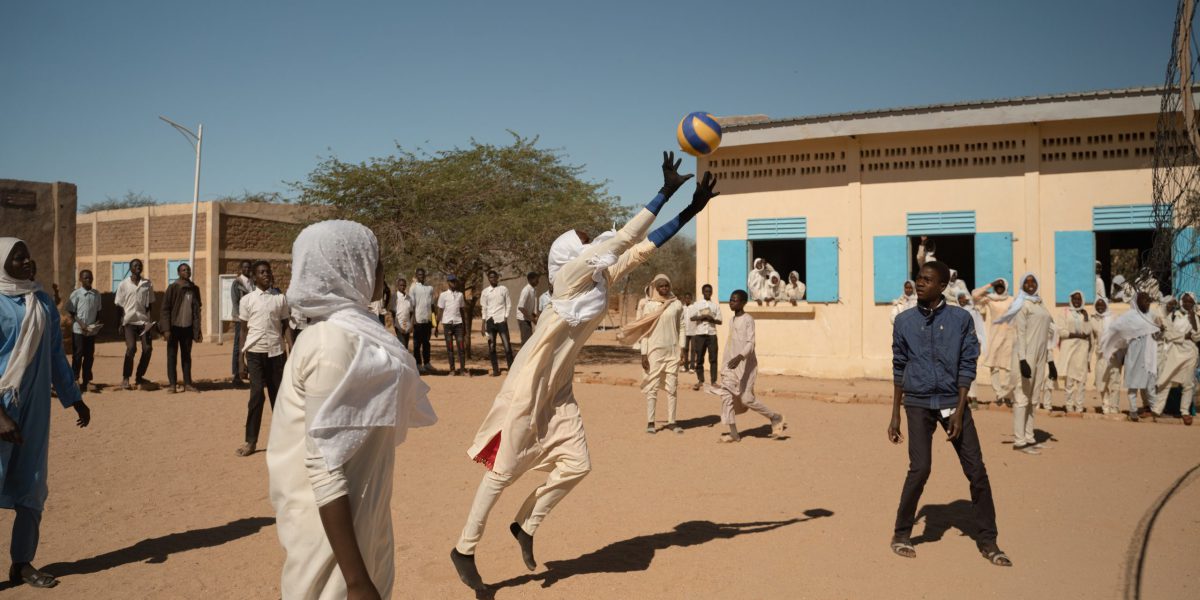
“After I finish exercising, I feel my body becomes strong,” said Noha, a volleyball player living in Eastern Chad. Noha is on a volleyball team with boys and girls, an unheard-of occurrence in this community before UNHCR Chad and JRS worked together to implement a “Sports for Protection” program in 2020.
Recognizing the need for a space where Noha and her peers could participate in sporting events, multilevel stadiums were constructed in two refugee camps, one in Milé and the other in Kounoungou. Over 4,500 students from nine local primary schools and the refugee camp communities come to play sports such as volleyball and football.
The “Sports for Protection” program is aimed at promoting the enrollment and retention of primary school students from both the local host communities and the refugee camp communities.
Five teachers and 19 youth residing in the camps participated in training focused on psychosocial support, conflict resolution, peace building, sports programming, monitoring, and evaluation. They now facilitate sporting events for the students.
Maqboula is a Sports Facilitator, she explained how this athletic program has enhanced a sense of equality and cohesion. “In the beginning, the community did not accept this project. But now the community allows girls and boys to play together,” she said.
One football player, Bashir, echoed this sentiment of improved and strengthened relations in the community. He explained that before the “Sports for Protection” program, he did not regularly interact with people in his community whose background or identity differed from his own. But now, through teamwork and group events, they “hang out and create bonds. Sports are very necessary,” Bashir said.
The benefits of training local community members to be Sports Facilitators are plentiful. Not only does it contribute to a sense of connectedness between students and teachers, but the Sports Facilitators also have the opportunity to learn more about youth leadership, psychosocial support, and interpersonal skills.
It was the Sports Facilitators who encouraged parents in the community to allow their daughters to participate in athletic teams. One Facilitator, Najwa, said that they “[the sport trainers] met with the parents and talked with them about the importance of sport for boys and for girls as well. [They] convinced [the parents] to allow the girls to play sports.”
Through six months of training followed by an 80-hour internship, the Facilitators learned to structure sporting activities that incorporate gender inclusion, teamwork, conflict resolution, peace building, and intercultural exchanges.
A youth Sports Facilitator, Babiker, reflected on what he learned through the training program. “I learned about the human rights, child protection, the problems of the disabled people…I am proud to be a sports teacher,” he said.
Education inspectors are another important piece of the “Sports for Protection” program. These individuals are trained to analyze the educational programs and provide guidance to teachers. One of the inspectors, Hamed, explained the significant impact athletics has had on the community’s students.
“Sports should be part of other basic subjects taught in school,” he said, “It is important for the child. A healthy mind resides in a healthy body.”
Hamed hopes that they continue to expand the “Sports for Protection” program so that more students can benefit from such positive impacts. Every child deserves the right to play, and this program only proves how integral teamwork, social cohesion, equality, and psychosocial support are essential to a student’s success.



